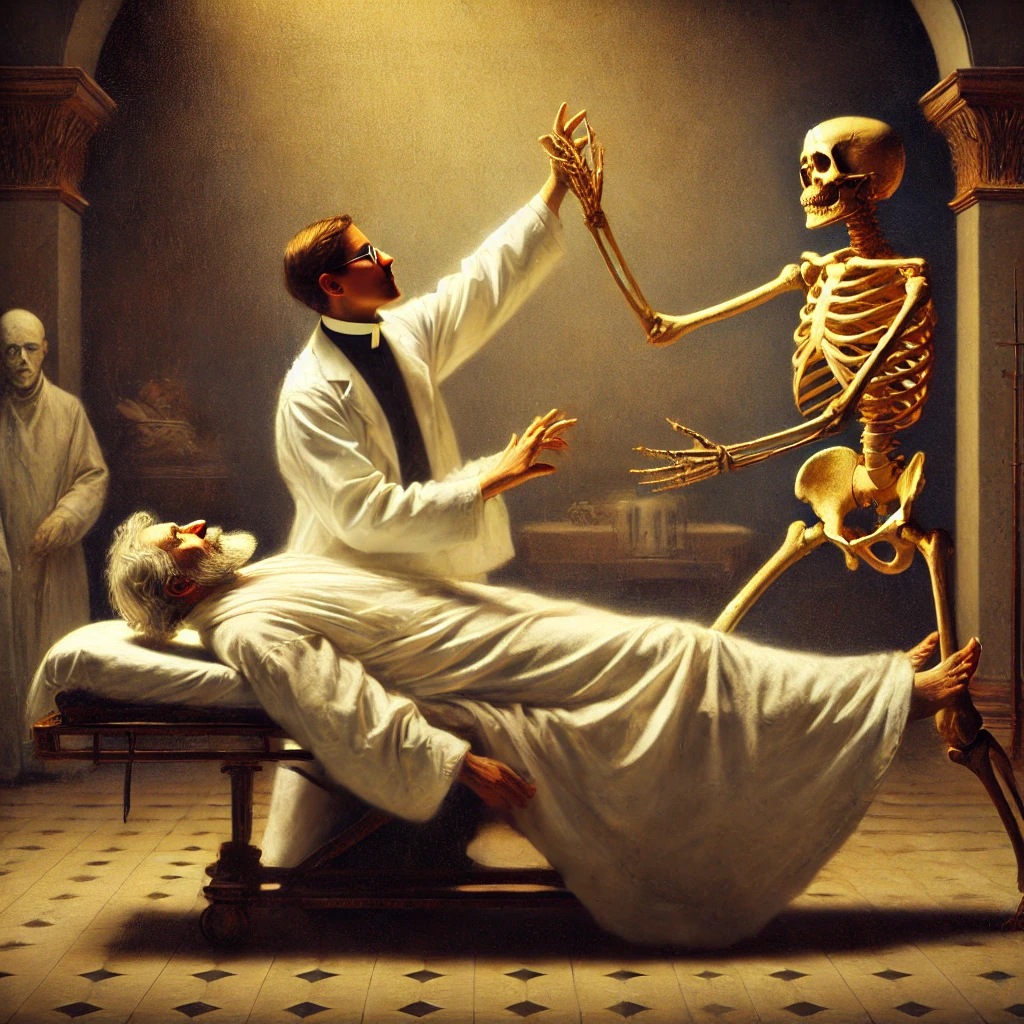

‘Het refrein is Hein. Dagen uit een verpleeghuis’ by Bert Keizer
- Title ‘Het refrein is Hein. Dagen uit een verpleeghuis’ by Bert Keizer
- Author Bert Keizer
- Year 1994
- Language Dutch
- Tags Intimate Portraits of Death Gender and Caregiving Death Outside the Law
- Legislative context Article 293 & 294 Criminal Code (1994) (Netherlands)
- Author of entry Sophia H. Rüfer
In Het refrein is Hein, Bert Keizer offers candid, philosophical, and often humorous reflections on life and death in the Dutch nursing home De Liefdeberg. Narrated by the fictional Anton but based on Keizer’s experiences as a nursing home physician, the book interweaves patients’ stories and Anton’s thoughts on medicine, mortality and the limitations of both religion and science in confronting death. Anton provides an unvarnished look at ageing, suffering, and the inevitability of death while reflecting on the ethical dilemmas faced by medical professionals, especially when it comes to assisted dying. He details his conversations with patients who recount their fears, doubts, desires, and struggles with the decision of whether or not to end their lives. The perspectives of family members and caregivers are also explored. These accounts range from heartfelt bedside vigils to distressing and sometimes absurd reactions to the impending death of a loved one. Throughout the book, Keizer presents a critical perspective on assisted dying, highlighting its ethical justifications and risks. He advocates for patient autonomy and the prevention of suffering while warning against “cosmetic euthanasia” – cases where death is hastened based on assumptions rather than consent.He shares cases of patients whose repeated pleas for assisted death were ignored, as well as instances where families pushed for a patient’s assisted death it out of exhaustion. Keizer also critiques inconsistencies in handling euthanasia requests, as some patients’ repeated pleas are ignored or dismissed. His reflections are deeply personal, and he admits to moments of doubt and panic when facing the gravity of these decisions. However, in most cases, he grants the final wish of his patients when asked about assisted dying. Keizer’s reflections take into account both philosophical ideas and practical realities. Without defining a stance that is explicitly for or against assisted dying, he debates its ethical implications and questions modern medicine’s role in prolonging life. The book offers insight into nursing home care and the challenges physicians face, inviting readers to reflect on medical ethics, patient autonomy, and end-of-life decisions
When published in 1994, Het refrein is Hein became a best-seller and was translated into various languages, including English, Spanish and German. The book gained widespread attention both nationally and internationally, with reviews appearing in mainstream media, medical journals, and academic publications. Het refrein is Hein thus paved the way for a more open discussion about assisted dying in the Netherlands. By highlighting the practical and ethical challenges faced by physicians, it has contributed to the development of the Dutch euthanasia policy. Following the book’s success, Keizer became a prominent voice in public discussions on euthanasia and assisted dying. He began writing columns for Medisch Contact and Trouw and frequently appeared on television and radio to comment on developments in end-of-life care. Keizer’s fictionalisation of his narrator Anton and the alterations he made to his book’s contents to protect patients’ privacy sparked debate over the book’s classification as fiction or non-fiction. He admitted to slight ‘embellishments,’ suggesting it contains elements of both. Blending philosophy, memoir, and fiction, this novel offers personal observations about medical practice and the ethical dilemmas surrounding life and death. Keizers’ later writings, including his columns, often revisit arguments first introduced in Het refrein is Hein.
Suggested citation
-
Het refrein is Hein. Dagen uit een verpleeghuis, Assisted Lab’s Living Archive of Assisted Dying, tba <link>
Reviews
- De verpleeghuisarts kan wat angst en pijn bij het sterven wegnemen De geest weet dat het lichaam moet sterven, Trouw, 1994 → trouw.nl
- Playing God, Underground Thomist, 1997 → undergroundthomist.org
- Dancing with Mr. D., Nederlands letterfonds/ Dutch foundation for literature, n.d. → letterenfonds.nl
- Dancing with Mr. D., Literatuur en Geneeskunde, n.d. → databases.literatuurengeneeskunde.nl
Media citations
- ‘Meneer vraagt al weken om de dood’, de Volkskrant, 1994 → volkskrant.nl
- ‘Het refrein is Hein’ komische situaties in sombere burcht, Leidsch Dagblad, 1995 → leiden.courant.nu
- Het refrein is Hein, NTVG (Nederlands Tijdschrifts voor Geneeskunde), 1995 → ntvg.nl
- Dancing with Mr. D., The Lancet, 1996 → thelancet.com
- Tussen fictie en non-fictie. Paratekstuele strategieën en de receptie van Het refrein is Hein, Tijdschrift voor Nederlande Taal- en Letterkunde, 2014 → dbnl.org
- Einde verhaal: Euthanasie en hulp bij zelfdoding in hedendaagse narratieve fictie, Wouter Schrover, 2015 → research.vu.nl
- Fictie als voedingsbron voor de dokter, Medisch Contact, n.d. → medischcontact.nl